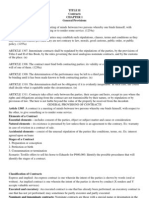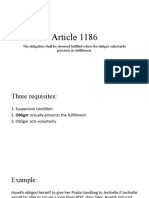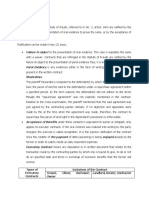100%(1)100% found this document useful (1 vote)
2K viewsArticle 1307
Article 1307
Uploaded by
norwiThis document discusses innominate and nominate contracts under Philippine law. It defines innominate contracts as those lacking individuality and not regulated by specific legal provisions, in contrast to nominate contracts which have established legal names like sale, lease, and agency. Innominate contracts are governed by the agreement of the parties, general contract law provisions, rules of analogous nominate contracts, and local customs. Examples of innominate contract types include do ut des, do ut facias, facio ut facias, and facio ut des.
Copyright:
© All Rights Reserved
Available Formats
Download as DOCX, PDF, TXT or read online from Scribd
Article 1307
Article 1307
Uploaded by
norwi100%(1)100% found this document useful (1 vote)
2K views1 pageThis document discusses innominate and nominate contracts under Philippine law. It defines innominate contracts as those lacking individuality and not regulated by specific legal provisions, in contrast to nominate contracts which have established legal names like sale, lease, and agency. Innominate contracts are governed by the agreement of the parties, general contract law provisions, rules of analogous nominate contracts, and local customs. Examples of innominate contract types include do ut des, do ut facias, facio ut facias, and facio ut des.
Original Description:
reference
Copyright
© © All Rights Reserved
Available Formats
DOCX, PDF, TXT or read online from Scribd
Share this document
Did you find this document useful?
Is this content inappropriate?
This document discusses innominate and nominate contracts under Philippine law. It defines innominate contracts as those lacking individuality and not regulated by specific legal provisions, in contrast to nominate contracts which have established legal names like sale, lease, and agency. Innominate contracts are governed by the agreement of the parties, general contract law provisions, rules of analogous nominate contracts, and local customs. Examples of innominate contract types include do ut des, do ut facias, facio ut facias, and facio ut des.
Copyright:
© All Rights Reserved
Available Formats
Download as DOCX, PDF, TXT or read online from Scribd
Download as docx, pdf, or txt
100%(1)100% found this document useful (1 vote)
2K views1 pageArticle 1307
Article 1307
Uploaded by
norwiThis document discusses innominate and nominate contracts under Philippine law. It defines innominate contracts as those lacking individuality and not regulated by specific legal provisions, in contrast to nominate contracts which have established legal names like sale, lease, and agency. Innominate contracts are governed by the agreement of the parties, general contract law provisions, rules of analogous nominate contracts, and local customs. Examples of innominate contract types include do ut des, do ut facias, facio ut facias, and facio ut des.
Copyright:
© All Rights Reserved
Available Formats
Download as DOCX, PDF, TXT or read online from Scribd
Download as docx, pdf, or txt
You are on page 1of 1
Art. 1307.
Innominate contracts shall be regulated by the stipulations of the parties, by the
provisions of Titles I & II of this Book, by the rules governing the most analogous nominate
contracts, and by the customs of the place.
NOMINATE CONTRACTS – is that which has a specific name or designation in law. (e.g
commodatum, lease, agency, sale etc.)
INNOMINATE CONTRACTS – those which lack individuality and are not regulated by special
provisions of law. Or those that which has no specific name or designation in law.
* Kinds of Innominate Contracts:
do ut des (I give that you may give) – An agreement in which A will give one thing to B, so that
B will give another thing to A.
do ut facias (I give that you may do) – An agreement under which A will give something to B, so
that B may do something for A.
facio ut facias (I do that you may do) – An agreement under which A does something for B, so
that B may render some other service for A.
facio ut des (I do that you may give) – An agreement under which A does something for B, so
that B may give something to A.
* Analogous contracts: Innominate contracts, in the absence of stipulations and specific
provisions of law on the matter, are to be governed by rules applicable to the most analogous
contracts.
RULES GOVERNING INNOMINATE CONTRACTS
1. the agreement of the parties
2. the provisions of the civil code on obligation and contracts
3. the rules governing the most analogous contracts
Types of nominate contracts: Sale, barter or exchange, lease, partnership, agency,
loan, deposit, aleatory, contracts, compromises, guaranty, pledge, mortgage, and
antichresis
Governed by special laws: insurance, real estate mortgage, and charter party d.
Customs of the place
4. the customs of the place
Custom—a rule of conduct formed by repetition of acts uniformly observed as a social rule,
legally binding and obligatory and it must be proved as a fact according to the rules of
evidence
CONTRACT - a juridical convention manifested in legal form, by virtue of which one or
more persons bind themselves in favor of another or others, or reciprocally, to the
fulfillment of a prestation to give, to do or not to do.
You might also like
- Articles 1262-1317 OBLICON NotesDocument34 pagesArticles 1262-1317 OBLICON NotesDanielle Alessandra T. CalpoNo ratings yet
- Articles 1179 - 1230Document4 pagesArticles 1179 - 1230MarkNo ratings yet
- Obligations With A PeriodDocument27 pagesObligations With A PeriodMajorie Arimado100% (1)
- Chapter 3: Different Kinds of Obligations Classification of ObligationsDocument21 pagesChapter 3: Different Kinds of Obligations Classification of Obligationselie lucidoNo ratings yet
- Obligation, Right, and Wrong (Cause of Action) DistinguishedDocument9 pagesObligation, Right, and Wrong (Cause of Action) DistinguishedMargaveth P. BalbinNo ratings yet
- Relativity of ContractsDocument7 pagesRelativity of ContractsCristy C. Bangayan100% (1)
- ObliconDocument4 pagesObliconRam BeeNo ratings yet
- Article 1341-1355 ObliconDocument2 pagesArticle 1341-1355 Obliconporeoticsarmy0% (1)
- Voidable Contract1.Docx CompleteDocument3 pagesVoidable Contract1.Docx CompleteJudith CastroNo ratings yet
- Article 1186: The Obligation Shall Be Deemed Fulfilled When The Obligor Voluntarily Prevents Its FulfillmentDocument15 pagesArticle 1186: The Obligation Shall Be Deemed Fulfilled When The Obligor Voluntarily Prevents Its FulfillmentPATRICIA AURELIONo ratings yet
- Article 1258 Discusses How To Consign or The Process To ConsignDocument2 pagesArticle 1258 Discusses How To Consign or The Process To ConsignAlyssa Mae Ogao-ogao100% (1)
- Summary of Chapter 8 - Unenforceable ContractsDocument4 pagesSummary of Chapter 8 - Unenforceable ContractsHannah dela MercedNo ratings yet
- Article 1767Document5 pagesArticle 1767Janaisa Bugayong EspantoNo ratings yet
- CCP Article 1156 1170 (Obligations)Document2 pagesCCP Article 1156 1170 (Obligations)Den100% (1)
- Article 1400-1420Document10 pagesArticle 1400-1420Princess Anne RicafortNo ratings yet
- Obligation & Contracts (2 Modes of ExtinguishmentDocument3 pagesObligation & Contracts (2 Modes of ExtinguishmentRachel Almadin100% (4)
- Oblicon Reviewer Chapter 1Document9 pagesOblicon Reviewer Chapter 1Carlos Hidalgo100% (1)
- Article 1305, Civil Code of The PhilippinesDocument4 pagesArticle 1305, Civil Code of The PhilippinesLope Nam-iNo ratings yet
- Article 1187Document3 pagesArticle 1187Rafi0% (1)
- Article 1192-1195Document7 pagesArticle 1192-1195Charlenemae DichupaNo ratings yet
- OBLICON REVIEWER Article 1157Document1 pageOBLICON REVIEWER Article 1157Oh Seluring100% (1)
- Contracts - Chapter 1 AGCAOILIDocument2 pagesContracts - Chapter 1 AGCAOILILeinard Agcaoili100% (2)
- Philippine Oblicon Articles 1231-1261Document22 pagesPhilippine Oblicon Articles 1231-1261Danielle Alessandra T. CalpoNo ratings yet
- Failure To Object: ARTICLE 1405Document4 pagesFailure To Object: ARTICLE 1405Joshua DaarolNo ratings yet
- Notes For Civil Code Article 1177 and Article 1178Document5 pagesNotes For Civil Code Article 1177 and Article 1178Chasz CarandangNo ratings yet
- Oblicon Answers1Document4 pagesOblicon Answers1Lorraine Mae Robrido100% (1)
- Article 1186Document2 pagesArticle 1186RafiNo ratings yet
- OBLICON REVIEWER Article 1160Document2 pagesOBLICON REVIEWER Article 1160Oh SeluringNo ratings yet
- Loss of The Thing DueDocument4 pagesLoss of The Thing DueAnge Buenaventura SalazarNo ratings yet
- ACTIVITY2Document4 pagesACTIVITY2shara santosNo ratings yet
- Article 1284 & 1285Document12 pagesArticle 1284 & 1285Joneric Ramos100% (1)
- CHAPTER 6 (Arts. 1380-1389)Document6 pagesCHAPTER 6 (Arts. 1380-1389)Kaye RabadonNo ratings yet
- Requisites of Negotiorum Gestio:: The Officious Manager (Gestor) Shall Be Liable For Any Fortuitous EventDocument4 pagesRequisites of Negotiorum Gestio:: The Officious Manager (Gestor) Shall Be Liable For Any Fortuitous EventEdione CueNo ratings yet
- ObliconDocument3 pagesObliconMonica Medina100% (2)
- Article 1284Document1 pageArticle 1284Mitz Arzadon100% (1)
- Distinction Between and Among The Defective ContractsDocument1 pageDistinction Between and Among The Defective ContractsAnge Buenaventura Salazar100% (1)
- LAW: Unenforceable ContractsDocument42 pagesLAW: Unenforceable ContractsfuddhaNo ratings yet
- ARTICLE 1163 To 1165Document7 pagesARTICLE 1163 To 1165JSPAMoreNo ratings yet
- Article 1270Document4 pagesArticle 1270Anonymous WmvilCEFNo ratings yet
- ARTICLE 1156 - 1160 DISCUSSION - Obligations and ContractsDocument6 pagesARTICLE 1156 - 1160 DISCUSSION - Obligations and ContractsKeith Jasper Mier100% (1)
- Characteristics of Contract of SaleDocument2 pagesCharacteristics of Contract of SaleAlieza100% (1)
- Article 1315 and 1316Document8 pagesArticle 1315 and 1316Janeiro Brix GonzalesNo ratings yet
- Art 1158Document2 pagesArt 1158Danica BalinasNo ratings yet
- Oblicon-Reviewer - 1156 - 1190Document10 pagesOblicon-Reviewer - 1156 - 1190Ash JuamanNo ratings yet
- Art. 1175. Usurious Transactions Shall Be Governed by Special LawsDocument2 pagesArt. 1175. Usurious Transactions Shall Be Governed by Special LawsKinitDelfinCelestialNo ratings yet
- 1348-1350 ObliconDocument2 pages1348-1350 ObliconCMLNo ratings yet
- Title II - ContractsDocument3 pagesTitle II - ContractsSha Napoles100% (1)
- Chapter 2 - Nature and Effect ObligationsDocument74 pagesChapter 2 - Nature and Effect ObligationsTanya KimNo ratings yet
- Object of ContractsDocument5 pagesObject of ContractsClarisseAccad100% (1)
- Nature and Effect of Obligations Article 1168-1169Document4 pagesNature and Effect of Obligations Article 1168-1169Jotham Del Rosario CansinoNo ratings yet
- Article 1216 and 1217, Civil CodeDocument2 pagesArticle 1216 and 1217, Civil CodeDindo Roxas100% (1)
- Oblicon ReviewerDocument6 pagesOblicon ReviewerFatima Elaine AtienzaNo ratings yet
- Articles 1189 - 1192Document31 pagesArticles 1189 - 1192Kyte AbogadieNo ratings yet
- Module 5 C Joint and Solidary Divisible and Indivisible ObligationsDocument11 pagesModule 5 C Joint and Solidary Divisible and Indivisible Obligationsairam cabaddu0% (1)
- Law On Obligations and ContractsDocument11 pagesLaw On Obligations and ContractsLeah Hope CedroNo ratings yet
- ObligationsDocument13 pagesObligationsZydalgLadyz NeadNo ratings yet
- ContractsDocument60 pagesContractsLyckaNo ratings yet
- Document 25Document12 pagesDocument 25Trisha NemenzoNo ratings yet
- OBLICON FIN.REVIEWER?Document6 pagesOBLICON FIN.REVIEWER?Trácy CalicàNo ratings yet
- Contracts: According TO Name OR DesignationDocument8 pagesContracts: According TO Name OR DesignationseriousblackxxNo ratings yet
- Sample Reaction PaperDocument2 pagesSample Reaction PapernorwiNo ratings yet
- Quennie Chavez: ObjectiveDocument2 pagesQuennie Chavez: ObjectivenorwiNo ratings yet
- Types of VesselDocument12 pagesTypes of VesselnorwiNo ratings yet
- Arrastre Charges: - Legal Basis - Formulas - Schedule - Usage - PPA RegulationDocument6 pagesArrastre Charges: - Legal Basis - Formulas - Schedule - Usage - PPA RegulationnorwiNo ratings yet
- Cargo ManifestDocument16 pagesCargo ManifestnorwiNo ratings yet
- Imports and Assessment System: Encodes The Arrival ScheduleDocument2 pagesImports and Assessment System: Encodes The Arrival SchedulenorwiNo ratings yet

































































